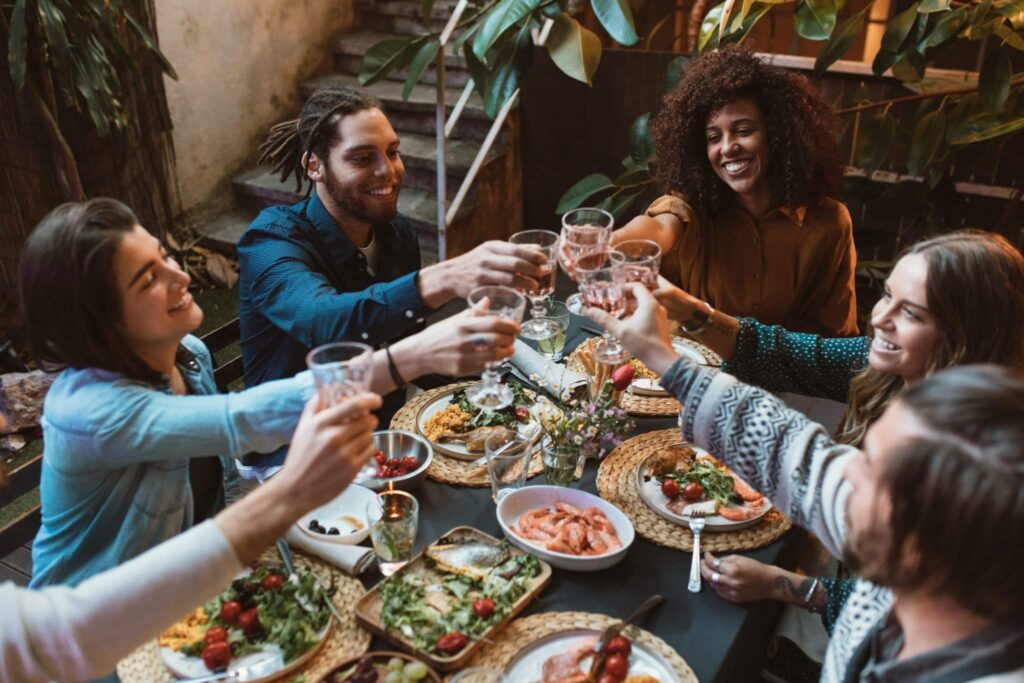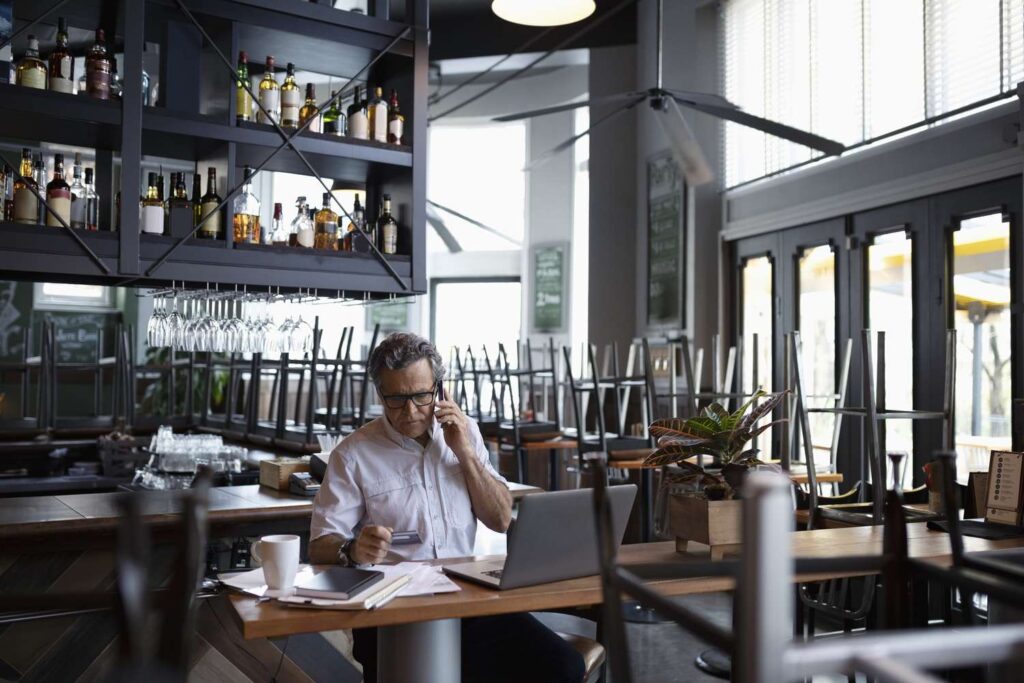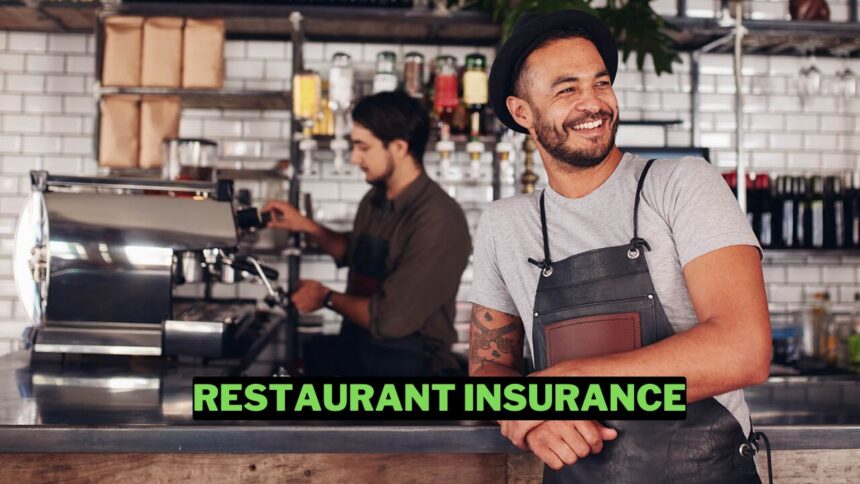Managing a restaurant can be quite demanding. In addition to concerns such as staff management, delivering excellent service, maintaining food quality, and ensuring a pleasant customer experience, there is also the crucial task of overseeing the administrative aspects of the business.
Managing a restaurant involves various responsibilities such as handling taxes, ensuring customer safety, maximizing profitability, and complying with regulations. These aspects can consume a significant portion of your time and effort. Additionally, it is crucial to secure restaurant insurance
This article serves as a concise and straightforward guide to help you understand the necessary insurance coverage for your restaurant, identify the leading insurance providers in the industry, and discover effective strategies to minimize your insurance expenses.
Do I Need Restaurant Insurance?

As a proprietor of a restaurant, it is essential to have proper insurance coverage. Unforeseen incidents like a kitchen fire can result in equipment damage and temporary closure. Accidents such as slips and falls in the dining area or food poisoning claims from guests are also potential risks.
Additionally, employees may sustain injuries while performing their duties. By selecting the appropriate insurance policies, you can safeguard yourself against these risks. It’s worth noting that certain types of coverage may be mandatory in your state.
To ensure affordable premiums for your restaurant insurance, it’s important to select only the necessary coverage and compare quotes from different insurance companies. Opting for bundled coverage can also lead to potential discounts, while choosing a higher deductible can help keep monthly costs down.
Additionally, taking proactive steps, like providing safety training to your staff, can help minimize risks.
What Is Restaurant Insurance?

Restaurant insurance is a combination of various insurance policies designed to safeguard against the specific risks faced by the restaurant industry. The insurance coverage required may vary depending on the type of restaurant.
For instance, a sandwich shop that offers delivery services will have different insurance needs compared to a pub that primarily serves beer. Below are some common insurance coverages that many restaurant owners typically require.
Workers’ Compensation Insurance
Workers compensation insurance is mandatory in the majority of states for businesses that have a certain number of employees. In certain states, even if you have just one employee, you must have workers’ compensation insurance.
This type of insurance is designed to cover the costs of medical bills and lost wages for your employees in case they suffer from injuries or illnesses related to their job duties. Additionally, it serves as a protective measure for restaurant owners against potential employee lawsuits.
Inland Marine Insurance
If your restaurant has equipment or inventory that you need to transport to other locations, it is important to have restaurant insurance that includes inland marine coverage.
This type of insurance specifically protects your business property while it is being transported, shipped, or stored off-site. However, if your equipment and inventory remain at your restaurant location at all times, you may not require this additional coverage.
Commercial Property Insurance
Commercial property insurance provides coverage for the costs of repairs or reconstruction in the event of damage to your restaurant’s building or its contents. This includes vital equipment in the kitchen.
Covered risks typically include fire, smoke, wind, hail, vandalism, certain types of water damage, building collapse, and damage caused by aircraft or vehicles. Restaurant insurance provides coverage for various damages and risks that may occur in your establishment.
For instance, if a car crashes into your storefront or if water damage occurs due to a leaking sprinkler, your insurance policy will cover the costs. However, it’s important to note that earthquakes and floods are usually not covered by standard restaurant insurance.
In such cases, some restaurant owners opt to purchase separate insurance policies specifically for these risks. Additionally, if you are renting the space for your restaurant, you may have the option to exclude coverage for the physical structure itself and only focus on insuring your equipment.
General Liability Insurance
General liability insurance is designed to cover the costs associated with legal fees and judgments if a customer sues the establishment for non-professional negligence.
This type of insurance includes coverage for property damage incidents, such as a waiter accidentally spilling wine on a guest’s fur coat, as well as physical injuries like slip-and-fall accidents.
Restaurant insurance provides coverage for medical expenses that arise from injuries sustained by customers while on the premises. Additionally, it offers protection against legal actions associated with advertising claims like defamation, copyright infringement, plagiarism, and malicious prosecution.
It is advisable to ensure that your general liability insurance also includes product liability coverage, which safeguards against lawsuits related to instances of food poisoning.
Business Interruption Insurance
Business interruption insurance provides coverage for the loss of income that occurs when your restaurant is forced to shut down due to a covered event.
This type of insurance is essential in situations where you need to repair damage caused by a windstorm, ensuring that you can still meet financial obligations such as mortgage or lease payments, taxes, loan installments, and employee payroll.
Business interruption insurance is commonly included in a comprehensive business owner’s policy (BOP) specifically designed for restaurant owners.
Business Owner’s Policy
Business owner’s Policy is a insurance package specifically created for small to midsize businesses, providing coverage for general liability, commercial property, and business interruption.
Additionally, business owners have the option to include additional coverages like equipment breakdown insurance to their policy.
Equipment Breakdown Coverage
In the unfortunate event that your restaurant’s essential equipment, like the air conditioning or oven, malfunctions or breaks down, it can severely disrupt your business operations. To safeguard against such incidents, having restaurant insurance that covers equipment breakdown is crucial.
This type of insurance provides protection for mechanical, electrical, and pressurized equipment failures, as well as refrigeration and air conditioning units and computers. Additionally, it may also cover the income lost during the repair period and the expenses incurred to replace spoiled food caused by the breakdown.
Liquor Liability Insurance.
Liquor liability insurance is a coverage that assists in covering the expenses of legal matters when your restaurant is deemed responsible for serving alcohol to someone.
This type of insurance not only provides protection for damages to your property but also covers medical expenses incurred due to incidents related to alcohol consumption.
It encompasses lawsuits involving assault, battery, property damage caused by an intoxicated individual, and even drunk driving incidents.
Food Contamination Insurance
Restaurant insurance for food contamination provides coverage for the cost of replacing lost food caused by contamination or equipment cleaning. In the unfortunate event that your restaurant is forced to close, this type of insurance can also assist in compensating for the loss of net income.
Spoilage Insurance
Spoilage insurance is a type of coverage that provides financial compensation to replace food that has gone bad as a result of a power outage or equipment malfunction at your restaurant.
Commercial Auto
If your restaurant possesses a truck or any other type of vehicle that is utilized for tasks like deliveries or other business-related activities, it is essential to have restaurant insurance for commercial auto coverage.
This type of insurance usually covers bodily injury and property damage liability, comprehensive and collision coverage, as well as medical payments and uninsured motorist coverage specifically for your commercial vehicles.
Hired and Non-Owned Auto Liability Insurance
When you ask one of your employees to use their own car to go and buy supplies for your restaurant, this is called using a vehicle for business purposes. In the unfortunate event that the driver gets into an accident, your restaurant could be held accountable for any damages.
To protect your business in situations where vehicles not owned by your restaurant are used for business operations, or if you rent or lease vehicles, it is essential to have a hired and non-owned auto liability policy. This policy will ensure that your restaurant is covered in case of any accidents or damages that occur during these instances.
What Insurance Does a Restaurant Need?
Restaurant insurance is essential for safeguarding restaurants against various potential risks. The primary types of coverage that are typically required for most restaurants include general liability, property insurance, and workers’ compensation insurance.
Depending on the specific needs of a restaurant, additional insurance options such as liquor liability insurance, commercial auto insurance, or hired and non-owned auto coverage may be necessary.
It is also advisable to consider adding spoilage insurance, food contamination insurance, equipment breakdown coverage, and business interruption insurance to the comprehensive package of insurance policies.
How Much Is Liability Insurance for a Restaurant?
Restaurant insurance is essential for protecting your business from potential risks and liabilities. Huckleberry offers a comprehensive package that includes coverage for business personal property and rental premises, all at an affordable price of $299 per year.
However, it’s important to note that the actual premium you will pay may vary depending on factors such as the size and location of your restaurant.
On average, a general liability policy from Huckleberry costs around $700 per year, but this can be higher or lower depending on your specific circumstances.
To ensure you get the most competitive price for your unique requirements, it is highly recommended to obtain quotes from multiple restaurant insurance providers.
Restaurant Insurance Cost
The cost of restaurant insurance will vary based on several factors, like the size and location of your business, the type of food you serve, and your target audience. Additionally, the specific coverage options you require for your restaurant will also impact the annual premium.
Restaurant owners can typically expect to pay approximately $4,000 per year for a comprehensive insurance package that includes a business owner’s policy, liquor liability insurance, and workers’ compensation.
However, those who require commercial auto coverage may have to pay a higher premium. Conversely, for restaurant owners who only require coverage for a rented space, there are business packages available starting as low as $299 per year.
Conclusion
Insurance for restaurants is a crucial element for the success of any establishment. By paying a monthly premium, you can safeguard your business from unexpected accidents. This type of insurance not only provides financial protection but also assists in managing any issues that may arise, allowing you to focus on efficiently running your restaurant.






This article provides valuable information about the different types of insurance that restaurant owners should consider. It’s important to have coverage for business interruption, equipment breakdown, liquor liability, food contamination, and commercial auto. The cost of insurance will vary depending on factors such as the size and location of the restaurant. It’s recommended to obtain quotes from multiple providers to get the
This article provides a helpful overview of the different types of insurance coverage that restaurant owners should consider. It emphasizes the importance of selecting the necessary coverage and comparing quotes to ensure affordable premiums. It’s a good reminder to take proactive steps, like staff safety training, to minimize risks.
Managing a restaurant is definitely a challenging task, and this article provides valuable information about the importance of having proper restaurant insurance coverage. It’s essential to protect against unforeseen incidents and potential risks. The tips on minimizing insurance expenses and selecting the necessary coverage are helpful. Overall, a great guide for restaurant owners.
This article provides great information about the different types of insurance that are essential for restaurant owners. It’s important to consider all the potential risks and liabilities and ensure that your business is properly protected.
I agree that insurance for restaurants is important for their success. It’s good to know that there are affordable options available for different needs.
I agree that insurance for restaurants is crucial for their success. It’s good to know that there are affordable options available for different needs.